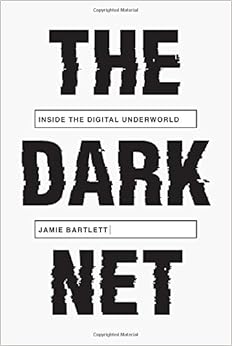One theme that came out of Book Blogger Appreciation Week (thanks to everyone, again, for making it awesome!) was that there are a lot of bloggers who read nonfiction and wish for more nonfiction reviews by other bloggers, without in fact themselves reviewing all that much nonfiction. Leaving the week, I promised myself that I would write more often about the nonfiction I’m reading. Hence: Jamie Bartlett’s The Dark Net.

Bartlett, a journalist and droplet for a UK think-tank, explores the grim and hidden corners, cultures, and economies of the internet, from neo-Nazis to drug dealers to amateur pornographers.
This is fundamentally a book about dissent, although not1 in the ways that many of its subjects would like to see themselves portrayed — as brave truth-tellers who have managed to resist the tyrannical dictates of the hive-mind. What became weirdly clear as I progressed through these chapters is the inescapability of in-group dissent. There cannot seem to exist any online space ever whose old-time residents don’t scowl blackly at newbies now and then, and wonder aloud if the new kids are even here for the right reasons.
The cultures of groups to which I do not belong — the norms and in-group rules that you can usually only learn by being in the group — will never fail to fascinate me, and this is where Bartlett really shines.
In a world awash with hardcore pornography, it’s personality and inventiveness that set the best apart. . . . “You have to be really, really imaginative,” Vex agrees. “It’s not easy.”
Vex has a strange knack of being able to twist everything into a part of her show. Her cat, Duchamp, keeps wandering in and out of the room, and is often brought on camera. Last year she started a sticker club, and created an enormous wall chart, with a list of regular viewers’ names. If you see Duchamp — sticker. If you tip a certain amount — sticker. It was wildly popular.
Sidebar: When I got to the chapter on camming, I was so, so relieved. I was like, Oh goody! I can read about amateur pornography now! Shit in this book gets dark, y’all.
One of the challenges of pop-nonfiction (I always find) is to strike the right balance between anecdote and context. Bartlett does this excellently. In each chapter, he runs down the history of his subject — particularly fascinating in the case of the Silk Road!2 — and shares stories of his personal encounters with the people involved in these worlds. Sometimes these are surreal, as this courteous and prompt email from a potential drug-dealer:
Vendor: Hi there! My advice is that starting small is the smart thing to do, so no problem if you want to start with 1 gram. I would too if I were you. I hope we can do some business! Kind regards.
Five stars, would buy illegal drugs from again.
Other times they’re a painful mix of sad and yucky, like the mild-mannered working man, Paul, who is perfectly agreeable until you get him on the subject of how brown folks running the government will destroy all beauty in this world; or the father and husband who accepts that he did wrong in watching pornographic videos of children, but also argues that it’s the internet’s fault for making it so easy to access. The echo-chambery-ness of the worlds these people choose to inhabit was upsetting in a way that made me want to spend a week or two in some corner of the internet where people think books are outdated and we should all abandon the written word forever. Like just to make sure I’m really being critical about why I like and think the things I like and think.
The juxtaposition of ferocious ideologies and the petty mundanity of the day-to-day squabbles and practical concerns makes for fascinating reading. I could have read a whole book about each of these chapters, and if Jamie Bartlett decides to write one, I gladly will.